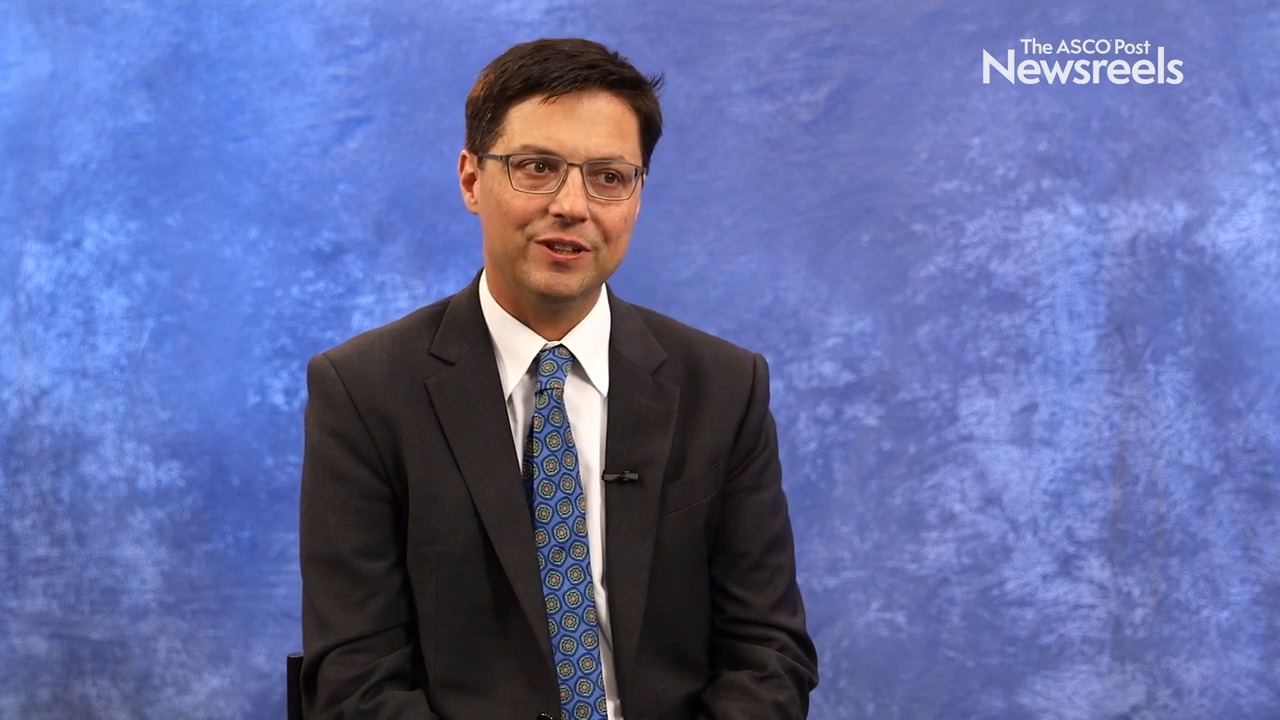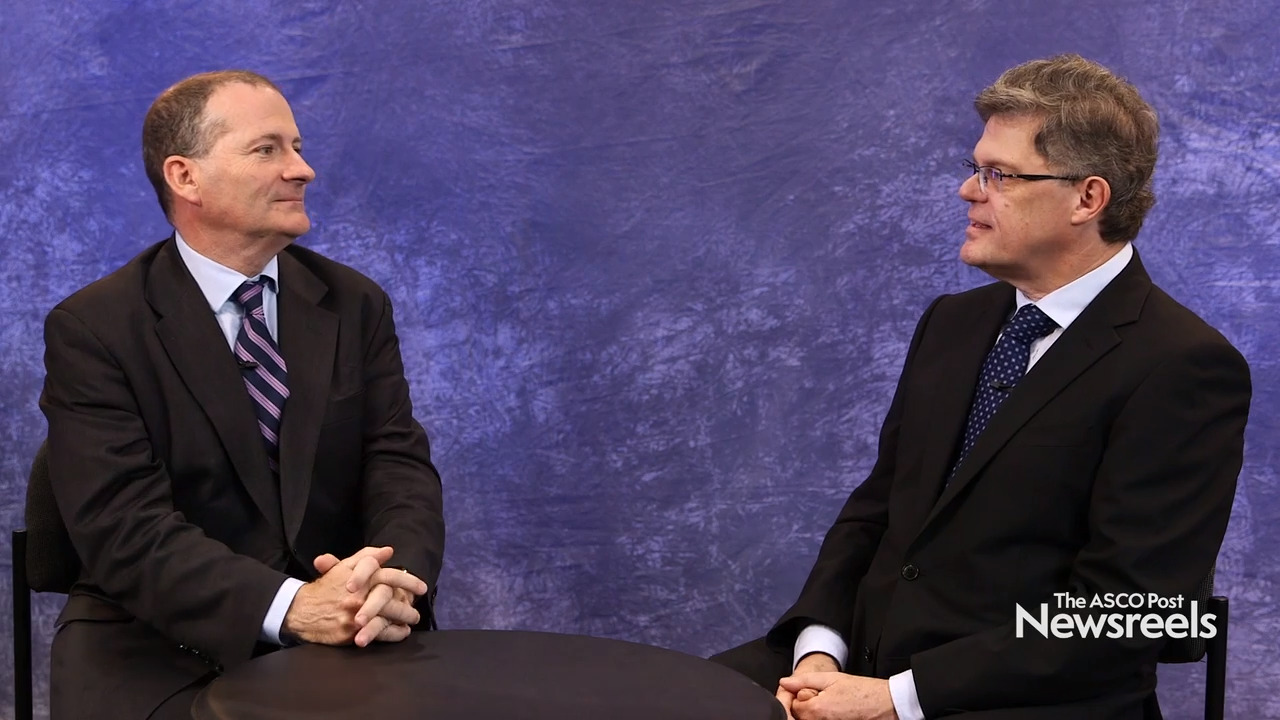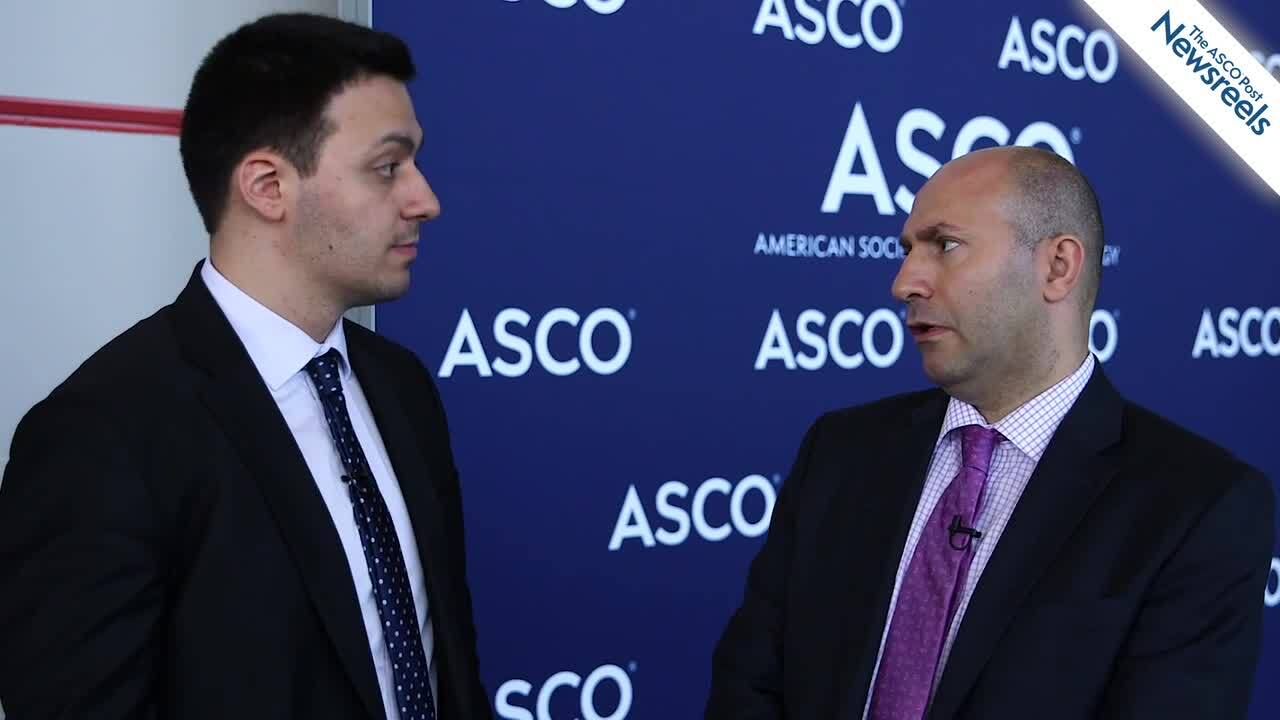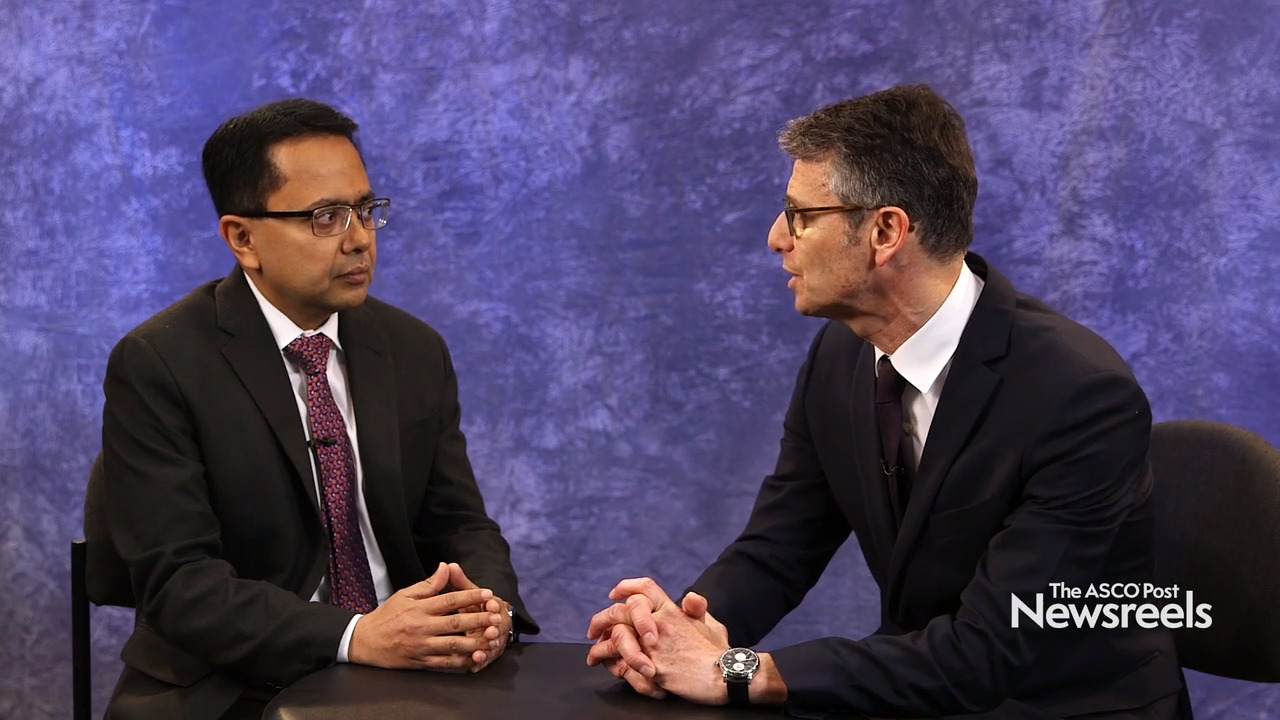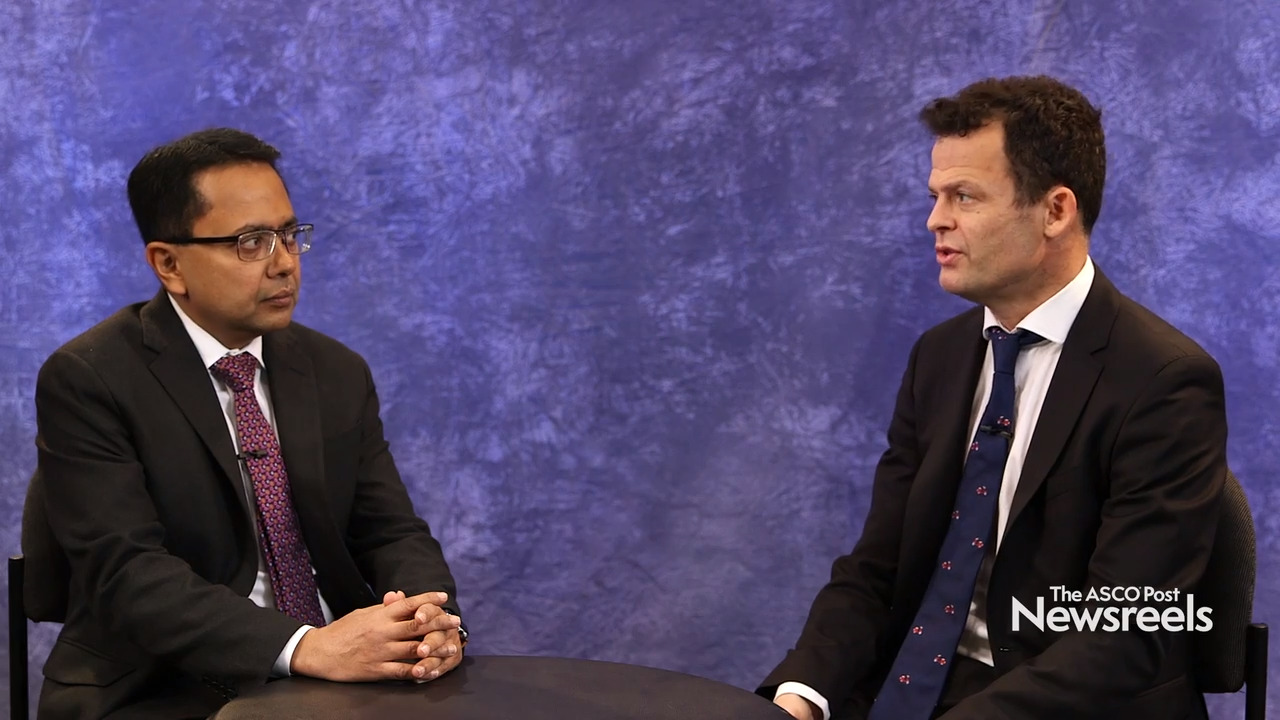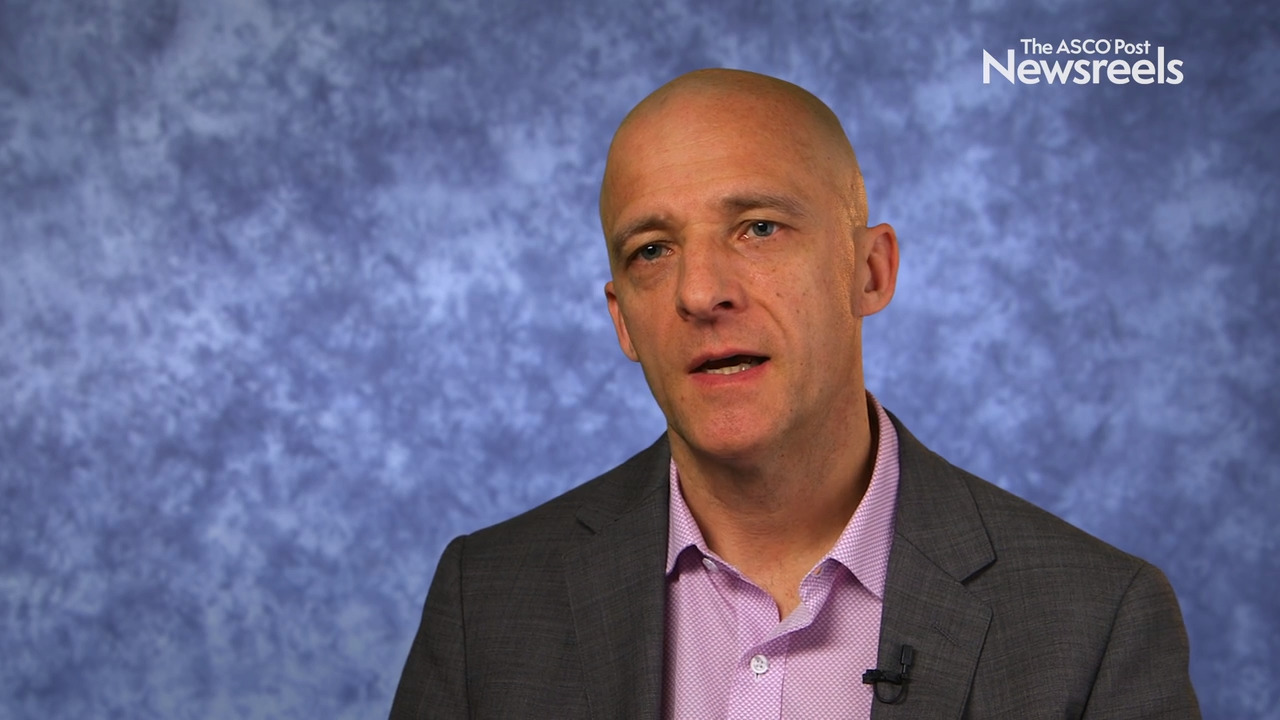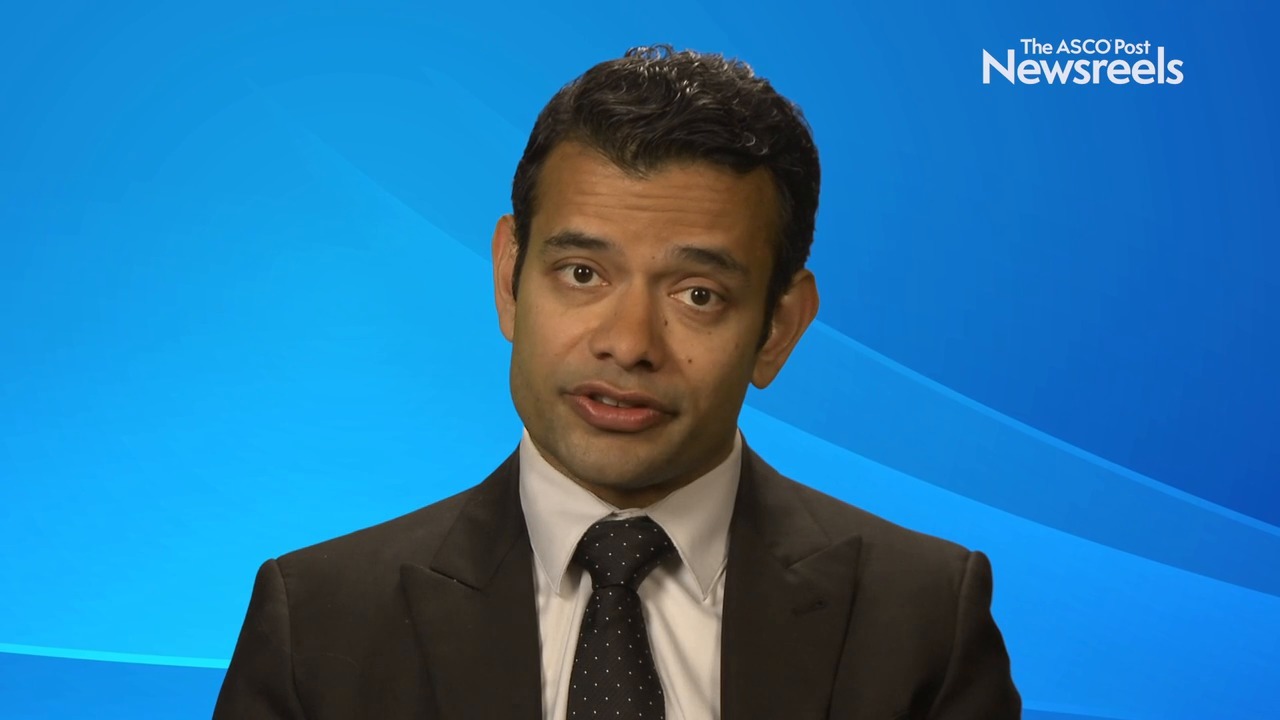CheckMate 214: Nivolumab/Ipilimumab vs Sunitinib in First-Line Treatment of Advanced Renal Cell Carcinoma
As reported in The Lancet Oncology by Robert J. Motzer, MD, of Memorial Sloan Kettering Cancer Center, New York, and colleagues, extended follow-up of the phase III CheckMate 214 trial has shown maintained survival benefit of first-line nivolumab/ipilimumab vs sunitinib among patients with...
Individualized Axitinib Regimens After Immunotherapy for Advanced Renal Cell Carcinoma
In a phase II study reported in The Lancet Oncology, Ornstein et al found that individualized axitinib regimens showed activity in patients with locally recurrent or metastatic renal cell carcinoma who had previously received immune checkpoint inhibitor therapy, although the progression-free...
Extended Follow-up of CheckMate 214: Nivolumab/Ipilimumab vs Sunitinib as First-Line Treatment for Advanced RCC
As reported in The Lancet Oncology by Robert J. Motzer, MD, and colleagues, extended follow-up of the phase III CheckMate 214 trial has shown a maintained survival benefit for first-line nivolumab/ipilimumab vs sunitinib in patients with previously untreated intermediate- or poor-risk advanced...
Novel Treatments Under Study in Renal Cell Carcinoma and Prostate Cancer
There were numerous notable presentations at the 2019 Genitourinary Cancers Symposium, many of which were covered in The ASCO Post over the past few months. To add to our continued coverage of this meeting, here are some highlights from studies focusing on novel therapeutics in renal cell carcinoma ...
Novel Treatments Under Study in Renal Cell Carcinoma and Prostate Cancer
There were numerous notable presentations at the 2019 Genitourinary Cancers Symposium, many of which were covered in The ASCO Post over the past few months. To add to our continued coverage of this meeting, here are some highlights from studies focusing on novel therapeutics in renal cell carcinoma ...
Long-Term Follow-up of Patients With Melanoma, Kidney Cancer, and Lung Cancer Receiving Nivolumab
As reported by Suzanne L. Topalian, MD, and colleagues in JAMA Oncology, long-term follow up of patients from a phase I expansion cohort study indicated 5-year overall survival rates of 34.2%, 27.7%, and 15.6% among patients who received nivolumab monotherapy for advanced melanoma, renal cell...
Notable Presentations at ASCO 2019 Included Studies in Sarcoma, Lymphoma, Myeloma, and Breast and Kidney Cancers
The 2019 ASCO Annual Meeting featured a wealth of presentations on important topics. In addition to our regular news coverage of the meeting, we present below some highlights of other studies that add to our knowledge base for treatment of various cancers. Olaratumab in Soft-Tissue Sarcoma...
Five-Year Survival in Heavily Pretreated Patients Receiving Nivolumab Monotherapy
As reported by Topalian et al in JAMA Oncology, long-term follow up of patients from a phase I expansion cohort study indicated 5-year overall survival rates of 34.2%, 27.7%, and 15.6% among patients who received nivolumab monotherapy for advanced melanoma, renal cell carcinoma (RCC), and...
FDA Approves Bevacizumab Biosimilar for Five Cancer Types
ON JUNE 28, the U.S. Food and Drug Administration (FDA) approved bevacizumab-bvzr (Zirabev), a biosimilar to bevacizumab (Avastin), for the treatment of five types of cancer: metastatic colorectal cancer; unresectable, locally advanced, recurrent, or metastatic nonsquamous non–small cell lung...
Benefit Seen With Targeted Therapies in Elderly and Medically Complex Patients With Metastatic RCC
Many elderly and medically complex patients with metastatic renal cell carcinoma (RCC)—who are often underrepresented in clinical trials—saw overall survival benefits from treatment with targeted therapies, according to a study that analyzed 13 years of data on Medicare patients...
FDA Approves Bevacizumab Biosimilar for Five Cancer Types
On June 28, the U.S. Food and Drug Administration (FDA) approved bevacizumab-bvzr (Zirabev), a biosimilar to bevacizumab (Avastin), for the treatment of five types of cancer: metastatic colorectal cancer; unresectable, locally advanced, recurrent, or metastatic nonsquamous non–small cell ...
Activity of Nivolumab for Renal Cell Carcinoma Brain Metastases
In an analysis of the phase II GETUG-AFU 26 NIVOREN study reported in the Journal of Clinical Oncology, Flippot et al found that nivolumab had limited activity in patients with previously untreated brain metastases from clear cell renal cell carcinoma. The study assessed nivolumab in patients with ...
2019 ASCO: No Benefit From Pazopanib in Advanced Renal Cell Carcinoma After Metastasectomy
The E2810 trial was conducted to determine whether treatment with the oral drug pazopanib following surgery to remove further metastases in patients with advanced renal cell carcinoma would improve their disease-free survival. Results from the study—which showed that primary endpoint of...
Leonard J. Appleman, MD, PhD, on Metastatic Renal Cell Carcinoma: Pazopanib vs Placebo After Metastasectomy
Leonard J. Appleman, MD, PhD, of UPMC Hillman Cancer Center, discusses phase III trial findings that showed a trend toward worse survival with pazopanib in patients with metastatic kidney cancer who exhibited no evidence of disease following metastasectomy (Abstract 4502).
Christopher Sweeney, MBBS, and Ian D. Davis, MBBS, PhD, on ANZUP: Taking a Multidisciplinary Approach to Prostate, Kidney, Bladder, Testicular, and Penile Cancers
Christopher Sweeney, MBBS, of Dana-Farber Cancer Institute, and Ian D. Davis, MBBS, PhD, of Monash University and Eastern Health, discuss the Australian and New Zealand Urogenital and Prostate Cancer Trials Group, working globally to speed clinical research in and treatment of urogenital cancers.
Ziad Bakouny, MD, and Toni K. Choueiri, MD, on Renal Cell Carcinoma: Checkpoint Inhibitors and Genomic Characterization of Sarcomatoid/Rhabdoid Disease
Toni K. Choueiri, MD, and Ziad Bakouny, MD, both of Dana-Farber Cancer Institute, discuss a retrospective review of genomically profiled patients with sarcomatoid/rhabdoid renal cell cancer who were found to have better outcomes with immune checkpoint inhibitors and to harbor mutations associated with poor prognosis (Abstract 4514).
Neeraj Agarwal, MD, and Arnaud Méjean, MD, PhD, on Renal Cancer: Cytoreductive Nephrectomy Followed by Sunitinib in the Metastatic Setting
Neeraj Agarwal, MD, of the Huntsman Cancer Institute, and Arnaud Méjean, MD, PhD, of the Hôpital Européen Georges-Pompidou, Paris Descartes University, discuss an update to the CARMENA trial with new phase III study results on the benefit of cytoreductive nephrectomy followed by sunitinib vs sunitinib alone in metastatic renal cell carcinoma (Abstract 4508).
Neeraj Agarwal, MD, and Thomas Powles, MD, PhD, on Renal Cell Carcinoma: KEYNOTE-426 on First-Line Pembrolizumab Plus Axitinib vs Sunitinib
Neeraj Agarwal, MD, of Huntsman Cancer Institute, University of Utah Health Care, and Thomas Powles, MD, PhD, of Queen Mary University of London, discuss phase III study findings on outcomes with combination therapy for intermediate/poor-risk and sarcomatoid subgroups of renal cell carcinoma (Abstract 4500).
IMmotion151: First-Line Atezolizumab/Bevacizumab vs Sunitinib in Metastatic Renal Cell Carcinoma
In the phase III IMmotion151 trial reported in The Lancet, Rini et al found that atezolizumab plus bevacizumab prolonged progression-free survival vs sunitinib in patients with previously untreated, programmed cell death ligand 1 (PD-L1)-positive, metastatic renal cell carcinoma. Study Details...
FDA Approves Avelumab/Axitinib Combination for Advanced Renal Cell Carcinoma
On May 14, the U.S. Food and Drug Administration (FDA) approved avelumab (Bavencio) in combination with axitinib (Inlyta) for the first-line treatment of patients with advanced renal cell carcinoma (RCC). This is the first FDA approval for an anti–programmed cell death ligand 1 (PD-L1) therapy as...
2019 Updates to NCCN Clinical Practice Guidelines in Genitourinary Oncology
The 24th Annual Conference of the National Comprehensive Cancer Network® (NCCN®) was held this past March in Orlando, Florida. Updates to a number of Clinical Practice Guidelines (NCCN Guidelines®) were reported, including three relevant to the field of genitourinary oncology: kidney cancer,...
New Drugs and Novel Indications for Genitourinary Cancers, FDA Approved 2017–2019
May 14, 2019: Avelumab (Bavencio) plus axitinib (Inlyta) for the first-line treatment of patients with advanced renal cell carcinoma (RCC). April 19, 2019: Pembrolizumab (Keytruda) plus axitinib (Inlyta) for the first-line treatment of patients with advanced renal cell carcinoma (RCC). April 12,...
Expert Point of View: Daniel George, MD
The CARMENA trial presented at the 2018 ASCO Annual Meeting, published simultaneously in The New England Journal of Medicine,1,2 and reported in this supplement to The ASCO Post, evaluated the role of nephrectomy in patients with metastatic renal cell carcinoma. Formal discussant of the trial,...
Cytoreductive Nephrectomy in Patients With Metastatic RCC Treated With Sunitinib
In a trial with a modified primary endpoint due to slow accrual reported in JAMA Oncology,1 Axel Bex, MD, PhD, and colleagues found that deferred cytoreductive nephrectomy after sunitinib did not improve the 28-week progression-free rate vs immediate nephrectomy followed by sunitinib in patients...
Retrospective Study Evaluates Cabozantinib in Advanced Non–Clear Cell Renal Cell Carcinoma
Cabozantinib, a kinase inhibitor, is approved in metastatic renal cell carcinoma on the basis of studies in clear cell histology. Its activity in non–clear cell renal cell carcinoma is poorly defined. In a retrospective cohort study, Nieves Martinez Chanzá, MD, and colleagues reported that...
TIVO-3: Tivozanib vs Sorafenib in Refractory Advanced Renal Cell Carcinoma
The TIVO-3 trial was conducted to confirm progression-free survival results from the TIVO-1 trial, which found an improvement in median progression-free survival in patients with metastatic renal cell carcinoma treated with tivozanib vs sorafenib. Findings from TIVO-3 were presented by Rini et al...
Early Tumor Shrinkage and Outcomes Following Cabozantinib or Everolimus
IN A RETROSPECTIVE analysis of median overall survival from the phase III METEOR trial,1 Ignacio Duran, MD, PhD, and colleagues sought to determine whether early tumor shrinkage following therapy with cabozantinib or everolimus could be an early indicator of prognosis for patients with...
Front-Line Therapy in Advanced Renal Cell Carcinoma: Developing a New Standard
THE FRONT-LINE systemic treatment landscape for metastatic renal cell carcinoma has undergone tremendous movement over the past several years. A better understanding of the current management paradigm for therapy-naive patients warrants a reflection of historic landmark clinical trials that have...
First-Line Therapy for Advanced Kidney Cancer: Combination Treatment vs Sunitinib
TWO RECENTLY reported phase III trials have shown the benefits of combination therapy vs sunitinib in the first-line treatment of advanced renal cell carcinoma. As reported in The New England Journal of Medicine by Brian I. Rini, MD, of Cleveland Clinic Taussig Cancer Institute, and colleagues,...
NCCN Clinical Practice Guidelines in Oncology: 2019 Updates
In 1996, the National Comprehensive Cancer Network® (NCCN®) published its first set of Clinical Practice Guidelines in Oncology (NCCN Guidelines®), covering eight tumor types. NCCN Guidelines are now published for more than 70 tumor types and topics. Some of the key updates for 2019 were presented...
Expert Point of View: Tracy Rose, MD, MPH
THE FORMAL DISCUSSANT of the KEYNOTE-427 trial, Tracy Rose, MD, MPH, of the University of North Carolina, Chapel Hill, told listeners: “I think pembrolizumab should now be considered an option for non–clear cell kidney cancer. Response rates, however, remain inferior to those seen in clear cell...
KEYNOTE-427: Pembrolizumab Shows Activity in Advanced Non–Clear Cell Kidney Cancer
IMMUNOTHERAPY WITH the checkpoint inhibitor pembrolizumab may prove to be an effective option for patients with advanced non–clear cell renal cell carcinoma, according to results in cohort B of the KEYNOTE-427 trial, presented at the 2019 Genitourinary Cancers Symposium.1 Kidney cancers with a...
A Year in Review
The past year has seen groundbreaking advances in the treatment of genitourinary (GU) cancers, which in some cases are resulting in altering the standard of care for patients with renal cell carcinoma, prostate cancer, and urothelial carcinoma. Some of the biggest changes that have occurred are for ...
Front-Line Therapy in Advanced Renal Cell Carcinoma: Developing a New Standard
THE FRONT-LINE systemic treatment landscape for metastatic renal cell carcinoma has undergone tremendous movement over the past several years. A better understanding of the current management paradigm for therapy-naive patients warrants a reflection of historic landmark clinical trials that have...
Hope and Fear Are Two Constants in the Lives of Patients With Cancer
A year and a half ago, when I was 33, the thought of having a life-threatening disease was unimaginable. In hindsight, the weight loss I began experiencing in the fall of 2017 should have raised concern because I’ve always had to be mindful of my diet if I wanted to lose weight. But denial can be a ...
First-Line Combination Treatments Improve Outcomes vs Sunitinib in Advanced Renal Cell Carcinoma
Two recently reported phase III trials have shown the benefits of combination therapy vs sunitinib in the first-line treatment in advanced renal cell carcinoma. As reported in The New England Journal of Medicine by Brian I. Rini, MD, of Cleveland Clinic Taussig Cancer Institute, and colleagues, the ...
FDA Approves Pembrolizumab Plus Axitinib for First-Line Treatment of Advanced Renal Cell Carcinoma
On April 19, 2019, the U.S. Food and Drug Administration (FDA) approved pembrolizumab (Keytruda) plus axitinib for the first-line treatment of patients with advanced renal cell carcinoma (RCC). KEYNOTE-426 Approval was based on KEYNOTE-426, a randomized, multicenter, open-label trial conducted in ...
Expert Point of View: Tracy Rose, MD, MPH
THE FORMAL DISCUSSANT of the KEYNOTE-427 trial, Tracy Rose, MD, MPH, of the University of North Carolina, Chapel Hill, told listeners: “I think pembrolizumab should now be considered an option for non–clear cell kidney cancer. Response rates, however, remain inferior to those seen in clear cell...
Study Finds Pembrolizumab Active in Advanced Non–Clear Cell Kidney Cancer
IMMUNOTHERAPY WITH the checkpoint inhibitor pembrolizumab may prove to be an effective option for patients with advanced non–clear cell renal cell carcinoma, according to results in cohort B of the KEYNOTE-427 trial, presented at the 2019 Genitourinary Cancers Symposium.1 Response rates were...
CALYPSO: Savolitinib Plus Durvalumab in Metastatic Papillary Renal Cell Carcinoma
THE COMBINATION of savolitinib and durvalumab achieved durable responses in approximately one-fourth of patients with metastatic papillary renal cell carcinoma in the phase II CALYPSO study.1 Treatment options are limited for papillary renal cell carcinoma. Clinical guidelines recommend enrollment...
Pembrolizumab/Cabozantinib Shows Activity in Previously Treated Renal Cell Carcinoma
THE COMBINATION of pembrolizumab and cabozantinib demonstrated antitumor activity in patients with previously treated metastatic renal cell carcinoma and both drugs were tolerable at their approved doses, according to data from a dose-escalation cohort of a phase I study.1 Among eight patients with ...
Nivolumab/Ipilimumab in Intermediate- and Poor-Risk Advanced Renal Cell Carcinoma
NIVOLUMAB PLUS low-dose ipilimumab continued to demonstrate strong responses as well as a survival benefit with a median of 32.4 months of follow-up as front-line treatment for patients with intermediate- and poor-risk advanced renal cell carcinoma, according to an update of the phase II CheckMate...
Evaluating Outcomes of Cabozantinib vs Everolimus in Advanced Renal Cell Carcinoma
IN A RETROSPECTIVE analysis of median overall survival from the phase III METEOR trial,1 Ignacio Duran, MD, PhD, and colleagues sought to determine whether early tumor shrinkage following therapy with cabozantinib or everolimus could be an early indicator of prognosis for patients with metastatic...
JAVELIN Renal 101: Avelumab Plus Axitinib vs Sunitinib in the First-Line Treatment of Advanced Kidney Cancer
THE PROGRAMMED cell death-ligand 1 (PD-L1) inhibitor, avelumab, was combined with the multitargeted vascular growth endothelial factor (VEGF) agent, axitinib, and compared to monotherapy with sunitinib in the first-line treatment of patients with metastatic renal cell carcinoma. Toni K. Choueiri,...
Expert Point of View: Lori Wood, MD
LORI WOOD, MD, of Dalhousie University in Halifax, Nova Scotia, Canada was the formal discussant for the KEYNOTE 426 study presented at the 2019 Genitourinary Cancers Symposium.1,2 Dr. Wood called the KEYNOTE 426 phase III trial “practice-changing,” and added, “The majority of patients with...
KEYNOTE 426: Pembrolizumab Plus Axitinib vs Sunitinib in First-Line Therapy for Advanced Renal Cell Carcinoma
AS REPORTED at the 2019 Genitourinary Cancers Symposium by Thomas Powles, MD, and as published in The New England Journal of Medicine by Brian Rini, MD, and colleagues, significant benefits in overall and progression-free survival were achieved with the combination of pembrolizumab plus axitinib...
Conference Highlights From the 2019 Gastrointestinal and Genitourinary Cancers Symposiums
THIS YEAR saw a huge turnout and a large number of scientific abstracts presented at both the 2019 Gastrointestinal (GI) Cancers Symposium, held on January 17–19, and the 2019 Genitourinary (GU) Cancers Symposium, held on February 14–16, both in San Francisco. The GU Cancers Symposium attracted...
Eric Jonasch, MD, on Kidney Cancer: A Year in Review
Eric Jonasch, MD, of The University of Texas MD Anderson Cancer Center, discusses major findings over the past 12 months in kidney cancer, including combination immunotherapies and trends in surgical oncology.
Actively Recruiting Clinical Trials Focused on Treatments of Kidney Cancer
The information contained in this Clinical Trials Resource Guide includes actively recruiting clinical studies that are focused on several different kinds of treatments for kidney cancer. These trials are evaluating gene therapy, immunotherapy, chemotherapy, radiotherapy, and combinations thereof....
Sumanta K. Pal, MD: Let's Get More Patients With Rare Tumors Into Clinical Trials
Sumanta K. Pal, MD, of City of Hope, talks about the need for investigators across the country to enroll their patients with rare tumors in clinical trials. He describes a trial he is leading for papillary kidney cancer and how others can join his efforts.
